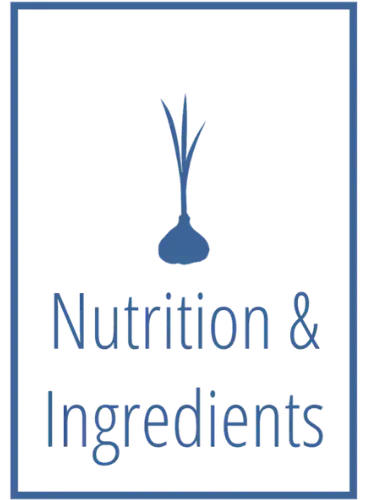Mountain Dew
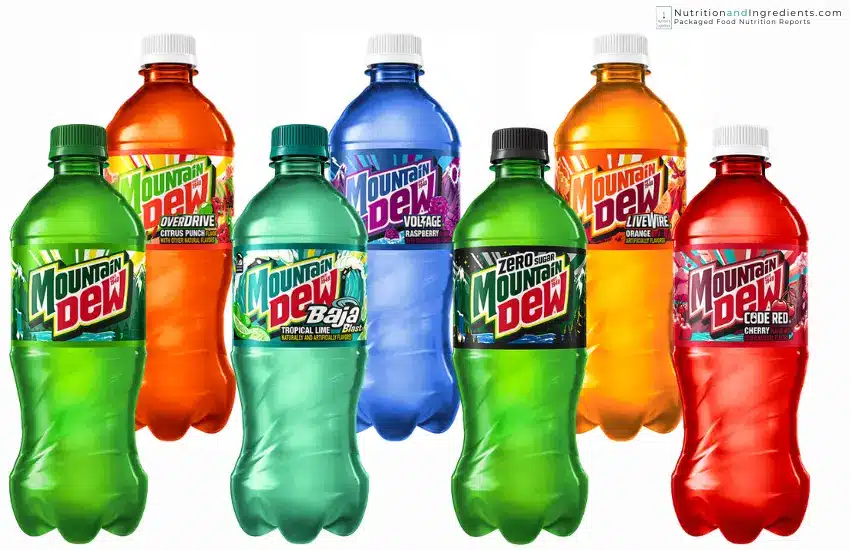
There are 290 calories and 91 milligrams of caffeine in a standard 20-ounce bottle of Mountain Dew. All of the calories are derived from sugars.
Review this report for a detailed look at the calories, nutrition facts, and ingredients in the carbonated soft drink.
As an information company, we provide unbiased food reviews and nutrition reports. If you make a purchase using links on this page, we may earn a commission (at no additional cost to you).
Mountain Dew Nutrition Information
Calories
One serving (20 fluid ounces) has 290 calories.
There is zero fat and zero protein in Mountain Dew. Accordingly, total carbs (added sugars) make up 100% of calories.
Mountain Dew
% calories from fat, carbs and proteinBased on 20 fl oz
Time to Burn Calories
An average adult would need to run at a moderate pace for approximately 25 minutes to burn off the calories from a 20oz Mountain Dew drink.
Here is a list of approximate times required to burn 290 calories, by type of exercise.
FITNESS TIME TO BURN 290 CALORIES
Estimate based on moderate level of activity by an adult with average BMI.
Nutrition Facts
Here is a summary of the nutrition facts for a 12oz and 20oz serving of Mountain Dew.
Amount per serving (%DV)
Red indicates %DV is high.
|
Serving Size |
12 fl oz |
20 fl oz |
|
Calories |
170 |
290 |
|
Total Fat |
0g (0%) |
0g (0%) |
|
Cholesterol |
0mg (0%) |
0mg (0%) |
|
Sodium |
60mg (3%) |
105mg (4%) |
|
Carbohydrates |
46g (17%) |
77g (28%) |
|
Total Sugars |
46g |
77g |
|
Added Sugars |
46g (92%) |
77g (154%) |
|
Protein |
0g |
0g |
%DV based on a 2,000 calorie diet. Calorie needs vary and your %DV may be higher or lower. Provided for informational purposes only. Consult with your physician for dietary or healthcare advice.

Total Sugars
There are 77 grams of total carbs in a 20oz drink, all of which are added sugars.
The amount of added sugars in a 20-ounce container exceeds the recommended limit for an entire day. It equates to a 154% daily value.
Calculate Daily Value
To calculate %DV, divide the amount of a nutrient in one serving by the FDA-recommended daily limit.
|
per 20oz |
Daily Limit* |
Daily Value | |
|
Added Sugars |
77g |
50g |
154% |
*Based on FDA general nutrition advice for an adult following 2,000 calorie daily diet.
Added Sugars
Ingredients include high fructose corn syrup and concentrated orange juice.
For reference, Dietary Guidelines for Americans suggest limiting calories from added sugars to less than 10% of total calories.
Mountain Dew does not provide a significant source of saturated fat, trans fat, cholesterol, dietary fiber, vitamin D, calcium, iron, or potassium.
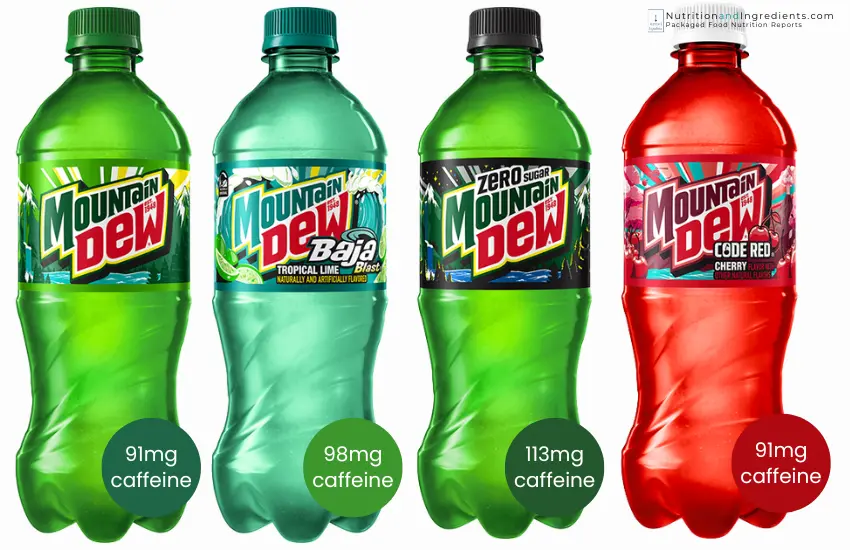
Caffeine
Mountain Dew contains caffeine. There are 91 milligrams caffeine per 20 ounce bottle of original Mountain Dew.
Here is a summary of the amount of caffeine in various sizes and flavors:
Caffeine in Mountain Dew
|
Flavor |
12 fl oz |
20 fl oz |
|---|---|---|
|
Mountain Dew |
54mg |
91mg |
|
Mountain Dew Zero Sugar |
68mg |
113mg |
|
Baja Blast |
59mg |
91mg |
|
Code Red |
54mg |
91mg |
|
Code Red Sugar Free |
68mg |
113mg |
|
Dragon Fruit |
55mg |
92mg |
|
Live Wire |
54mg |
91mg |
|
Maui Burst |
54mg |
92mg |
|
Voltage |
55mg |
91mg |
For comparison, an 8.4 fl. oz. can of Red Bull contains 80 milligrams of caffeine. An average brewed coffee contains 95 milligrams per cup, and a Coca-Cola has 34mg caffeine in the smaller 12-ounce bottle.
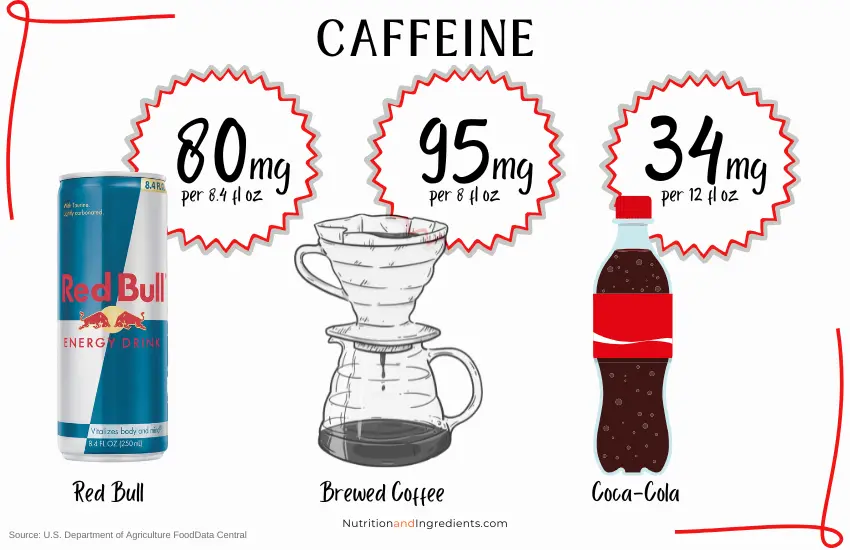
Mountain Dew Ingredients and Allergens
Ingredients
Review the following tables for a list of ingredients in original Mountain Dew and select special flavors, including Code Red Cherry, Live Wire Orange, Voltage Raspberry, and Baja Blast Tropical Lime.
Original Mountain Dew |
|---|
|
Carbonated Water, High Fructose Corn Syrup, Concentrated Orange Juice, Citric Acid, Natural Flavor, Sodium Benzoate, Caffeine, Sodium Citrate, Gum Arabic, Erythorbic Acid, Calcium Disodium EDTA, Yellow No. 5 |
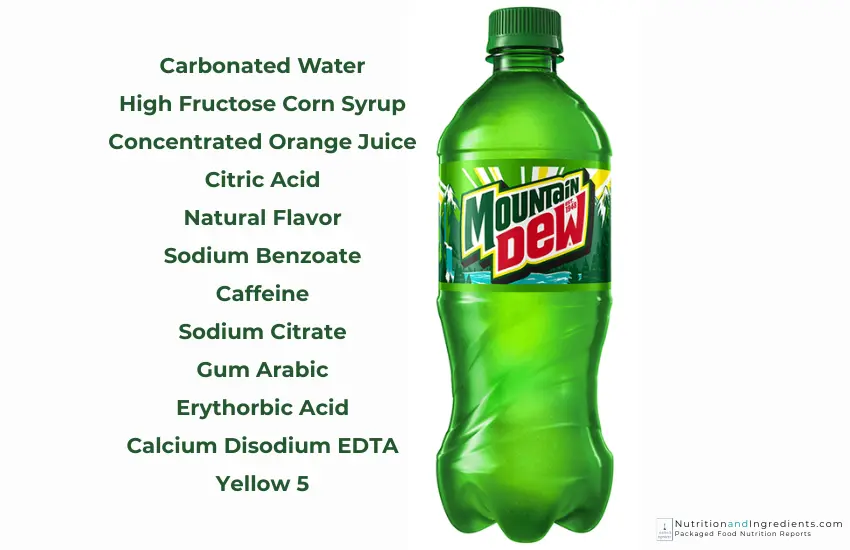
Mountain Dew Zero Sugar |
|---|
|
Carbonated Water, Citric Acid, Natural Flavor, Potassium Benzoate, Citrus Pectin, Aspartame, Potassium Citrate, Caffeine, Gum Arabic, Acesulfame Potassium, Sucralose, Sodium Citrate, Calcium Disodium EDTA, Yellow No. 5 Contains phenylalanine |
Mountain Dew Baja Blast |
|---|
|
Carbonated Water, High Fructose Corn Syrup, Natural and Artificial Flavor, Citric Acid, Sodium Benzoate, Caffeine, Gum Arabic, Sodium Citrate, Calcium Disodium EDTA, Sucrose Acetate Isobutyrate, Yellow No. 5, Blue No. 1 Mountain Dew Baja Blast contains 0% fruit juice. |
Mountain Dew Code Red |
|---|
|
Carbonated Water, High Fructose Corn Syrup, Concentrated Orange Juice, Citric Acid, Sodium Polyphosphates, Sodium Benzoate, Natural Flavor, Caffeine, Sodium Citrate, Gum Arabic, Calcium Disodium EDTA, Red No. 40, Yellow No. 5, Blue No. 1 Mountain Dew Code Red contains less than 1% juice. |
Mountain Dew Live Wire |
|---|
|
Carbonated Water, High Fructose Corn Syrup, Concentrated Orange Juice, Natural and Artificial Flavor, Citric Acid, Sodium Benzoate, Caffeine, Sodium Citrate, Gum Arabic, Yellow No. 6, Calcium Disodium EDTA, Yellow No. 5, Red No. 5 Mountain Dew Live Wire contains <1% juice. |
Mountain Dew Voltage |
|---|
|
Carbonated Water, High Fructose Corn Syrup, Natural Flavor, Citric Acid, Sodium Benzoate, Caffeine, Sodium Citrate, Gum Arabic, Calcium Disodium EDTA, Panax Ginseng Root Extract, Blue No. 1, Red No. 40 Mountain Dew Voltage contains 0% juice. |
Studies have shown that acids in many bottled soft drinks contribute to dental erosion. As the pH level in the oral cavity drops, the tooth surface softens and erodes.
Allergens
The FDA recognizes nine foods as major allergens, including milk, eggs, fish, peanuts, sesame, shellfish, soy, tree nuts, and wheat.
Mountain Dew is not made with any of the items that are considered common allergens.
Review Bottled Drinks Nutrition Reports

We publish 100% unbiased food and beverage reports based on in-house staff review and analysis of nutrition and ingredients data. We do not use AI or automated data APIs. We do we accept incentives in exchange for special consideration for reviews. Direct links to online retailers such as Amazon are provided on this page for your convenience. If you are interested in Mountain Dew products and make a qualifying purchase using a link on this page, we may (not always) receive a small referral fee (at no additional cost to you). Commissions help cover the cost of publishing free nutrition reports. Please read our disclosure.
Nutrition facts, prices, and ingredients are based on available information as of the date of publication. Restaurants and food manufacturers may change recipes or formulations without notice. Check package labels and ask the product manufacturer or restaurant for the most up-to-date information. Unless otherwise stated, %DV is based on a 2,000 calorie diet. All reports and reviews published on this site are for informational purposes only. NutritionandIngredients.com does not provide healthcare advice or dietary recommendations. Always consult your licensed physician for any healthcare or dietary advice.
Nutrition facts and ingredients source: Mountain Dew labels/PepsiCo
